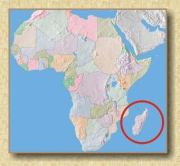I haven’t seen my girlfriend in nearly four months. We talk on our cell phones a few times every day, but it’s just not the same. In phone conversations Michelle’s freckles don’t dance in front of me.
Michelle’s Peace Corps experience has been rougher than mine. If she were to keep a blog, my blog would look as exciting as a congressional committee hearing. Her site village, which is on the east coast, is twice as large as my village, and the people there are rowdy. I will quickly highlight Michelle’s first four months at her village: Her home had rats the size of cats in it, she developed a rash from head to toe for two days, she was groped by a drunken old man on the street, she contracted giardia, the principal at her middle school died from malaria, people of all ages barge into her home to express their interest in learning English or to confess their love for her, her students behave like ring-tailed lemurs, she’s attended a few school faculty parties that have involved lots of ass shaking and 9 A.M. whiskey consumption, she went to a few music festivals, her love for smashed cassava leaves and rice has surpassed her love for me, she has taken up sewing, and she runs long distances barefoot on the beach. Peace Corps wisdom says that volunteers have ups and downs in adjusting to the host country. My time since training has been one long period of ups, while Michelle has had the more conventional ups-and-downs experience.
Tomorrow I’m flying to the capital, Tana, for a meeting with my stage of volunteers. Michelle will be there, and I’ve already promised that upon seeing her I will hug her so hard her head’ll pop off. Then we volunteers will spend a few days at the Peace Corps training center in Mantasoa, the small town with pine trees and a lake. For the Christmas break Michelle and I are going to her site village for a week, then off to Isle St. Marie, a picturesque resort island a ferry ride away from mainland Madagascar. Our Christmas and New Year’s Day will be spent eating mangos, getting sunburned, and thinking of our families and friends in America. Until next time, happy holidays!



 Posted by Jordan Butler
Posted by Jordan Butler 


